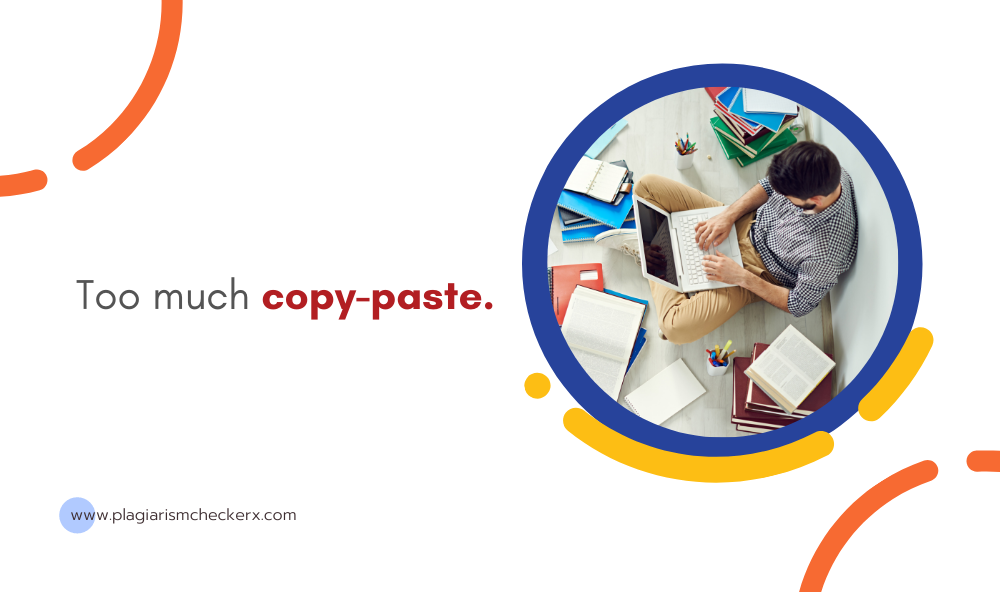What is Plagiarism?
In most of the cases, people shrug off their shoulders by taking plagiarism too lightly. A common perception of plagiarism is ‘copying another's work or borrowing someone else's original ideas'. However, terms like "copying" makes the offense look a little lighter. As per Merriam-Webster Online Dictionary, the word "Plagiarize" means the following:
- To steal and pass off (ideas/words) of others
- Using others' production without proper citation
- Committing a literary theft
- Presenting someone's ideas or product as something new

According to the Oxford English Dictionary, plagiarism is; "The practice of taking someone else's work or ideas and passing them off as one's own". So, plagiarism is blatant theft of ideas, words, or products of others.
Some of the leading examples of plagiarism include the following:
- Copying a paper verbatim that is available in digital or printed form.
- Taking someone else's work and presenting it as completely your own.
- Handing in or submitting the papers that you didn't write actually.
- Using other author's ideas, text, or work without proper citation.
- Paraphrasing
- Failing to put a quotation mark on the quoted work.
- Copying more than a fair amount of words from some paragraph and rephrasing it as your own work. (if that is cited properly, will not be considered plagiarism).
Types of Plagiarism
There are many types of plagiarism. We are just quoting a few of them.
- Direct Plagiarism: It is the word-for-word transcription of a section of someone else's work, where the user doesn't use quotation marks or proper citation. Such deliberate actions are considered unethical and academic dishonesty.
- Self-Plagiarism: This occurs when a person submits his/her own previous work or a mixture of past assignments without permission from the professors, involved.
- Patch Writing: This is also called as "Mosaic Plagiarism." It occurs when a student borrows phrases from a source without using quotation marks. Or s/he finds synonyms for the author's language but keeps the same general structure and meaning of the content.
- Accidental Plagiarism: Such situation happens when a person neglects to cite their sources, or misquotes them. Unintentional paraphrasing or grouping of words that match some other source may also fall under this. Cases of accidental plagiarism are taken as seriously as any other plagiarism.

Can Ideas/Words Be Stolen? A Legal Perspective
Looking at the legal position, there are ample evidences and proofs that favor the answer 'yes'. Expression of an idea in a certain way is considered as intellectual property that is protected by copyrights laws. According to US Law, it is a major offense that may involve certain penalties alongside financial compensation to the original source/writer. To better understand it, just take ideas as someone's 'originally invented product'.
Consequences of Plagiarism?
As plagiarism is considered an offense, its fallouts are not positive for the person/institution accused of. Look at the following probabilities.
- Destroyed reputation of the individual
- Destroyed reputation of the academic intuition
- Failure in the particular assignment
- Rewards of low grades in the course
- Academic penalties
- Academic probations
- Dismissal from the university
- Lawsuits for copyrights violation
- Financial compensation for the original writer

How to Avoid Plagiarism?
By following the simple suggestions, one can easily avoid plagiarism and its negative consequences listed above.
- In most of the cases, we can avoid it by citing original sources. A simple acknowledgement that certain material has been borrowed from the said source can keep things normal.
- A student can certainly improve his learning of different citation styles to avoid such academic hassles. Plagiarism Checker X has also tried to help students by making a dedicated page of 'referencing guide'.
- Even if we try our best, it may happen that we may fall prey to plagiarism, unintentionally. Therefore, the last option is to download a plagiarism detector like Plagiarism Checker X and use it for every assignment. Spend a little amount and time on such scanning service and save yourself from embarrassment and penalties.
There are many academic portals that can help you learn more about plagiarism, its different forms, and how to avoid it.
References
Academic Integrity Assessment Team. "Definitions of Academic Dishonesty." Proposed Honor System - Texas A&M University. Comp. Bill Kibler. Texas A&M University, 2003 Definition of plagiarism in English
The Copy Paste Inventor
Larry Tesler, couldn't have thought how his innovation would be misused in the future. Don't let your originality drown! Stay credible and avoid accidental Plagiarism with Plagiarism Checker X ✨
